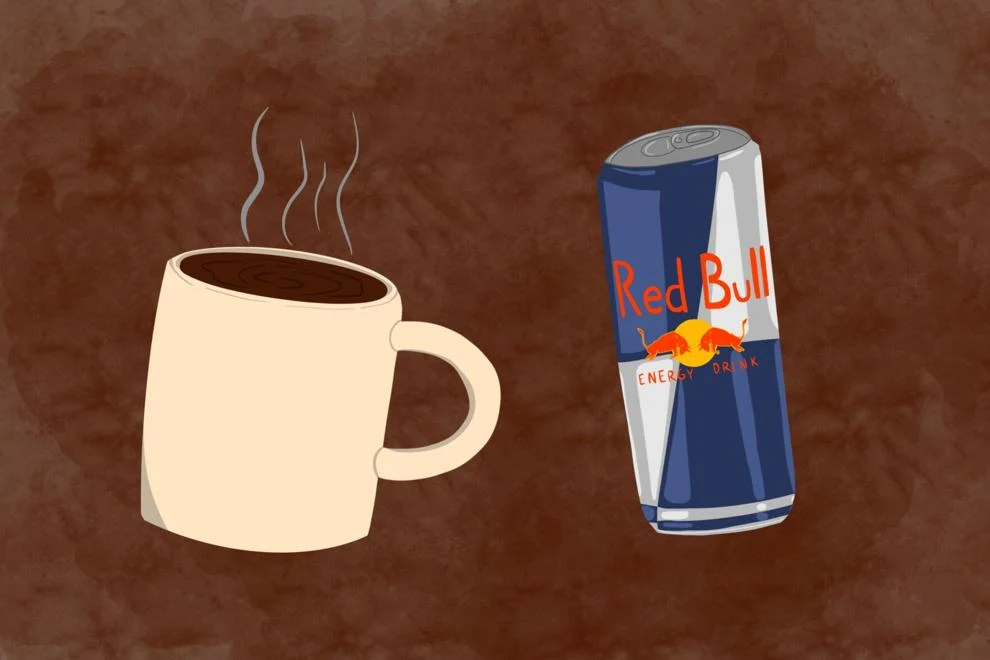Alyssa:
The consumption of caffeine has been prevalent in society for several centuries. Along with it arises the mental debate of deciding to intake caffeinated products or to stray away from them, and this decision has become a universal experience for people of all ages. Caffeine comes in many different forms, whether that be energy drinks, tea, soda, chocolate, coffee, or the countless other options to wake one up in the morning. Coffee is the most effective for a variety of reasons.
A large percentage of teenagers start to heavily depend on caffeinated products to get them to focus on their study sessions, to help them stay awake in their classes, etc. Usually, the choice of intake is either tea, coffee, or, more recently, energy drinks. The regularity of teenagers consuming caffeine has raised many concerns, but it is the favored form of caffeine that seems to make this phenomenon even worse.
Caffeine being extremely normalized is a bit unsettling, considering the countless side effects that are associated with it. Caffeinated products are harmful to people’s health and can cause heightened levels of anxiety, digestive issues, and heart problems. Intaking caffeine in moderation can help regulate these side effects, but with the widespread consumption of energy drinks such as Celsius, Alani Nu, Red Bull, and Monster, this regulation is not as easy to monitor. Throughout the school day, at least one person in each class has some sort of caffeinated beverage; those who choose to drink energy drinks worsen their health in comparison to those who choose healthier options.
Although caffeine has primarily become a daily ritual for the start of many people’s days or is necessary to fight off feelings of drowsiness, with the increase in popularity of energy drinks, it has sort of become a drink of choice based solely on its flavor. Frequently, teenagers and adults do not realize how much caffeine they are actually drinking when they pick up their favorite energy drink. Intake of energy drinks that contain 150 plus grams of caffeine every day is heavily impacting consumers’ health, and they may not even be realizing it.
When taking into account the excessive amounts of caffeine that are in energy drinks, it may be a good idea to switch to different kinds of caffeinated products that pose less harmful effects to people’s health, like coffee. Coffee is another popular form of caffeine, and it poses drastically less negative health effects than energy drinks do. Coffee is more natural than energy drinks and the caffeine contained in one cup is significantly less; it still provides energy, but at a much healthier amount.
Besides being healthier, coffee is also more varied than energy drinks. Energy drinks all have similar tastes, but coffee drinks can be tailored to each individual, whether it be black or flavored. If those who drink caffeinated drinks do not particularly enjoy the taste of coffee, there are even more alternatives that have gained recognition, such as matcha. It is yet another replacement for energy drinks that provides just enough of an energy boost to get someone through the day, without the excessive amounts of caffeine.
Overall, if caffeine is something that someone has become accustomed to, it can be a good idea to pick a type of beverage that will not affect their health in an exceedingly negative way. Coffee is a much better alternative to energy drinks; the excessive intake of caffeine due to energy drinks should be addressed more often than it currently is.
Emerson:
The discussion about caffeine, from energy drinks to coffee, is becoming more prevalent as new forms of caffeinated beverages emerge. Students at OHS have different preferences when it comes to how they get their boost of energy. From energy drink-containing Dutch Bros Blended Rebels to Starbucks Pumpkin Spice Lattes, each student has numerous options. However, it is clear as to which is superior. Energy drinks contain elements that are ideal for demanding school days. Plus, energy drinks come in a variety of flavors and are practical for busy students on-the-go. This makes energy drinks the favored choice for many seeking effective and immediate energy.
Energy drinks, which are becoming increasingly popular among younger generations such as Generation Z and Millennials, offer the burst of caffeine that is necessary when it comes to waking up in the morning and locking in for a day of academics. A medium Dutch Bros Rebel, a popular drink among OHS students in the morning, contains approximately 114 mg of caffeine. Similarly, the average medium cup of coffee contains 130 to 180 mg of caffeine. Since both products can be similar in caffeine content, students often put flavor and taste as the top priority when deciding their preferred beverage.
Energy drinks and coffee have distinct flavors, and the choice that consumers make really depends on which strong taste they are feeling for that particular morning. Both drinks, when going to a coffee shop, can be altered, whether it be with sweeteners or extra flavors. Coffee is characterized by a more recognizable flavor. After all, there is a reason why consumers can get “coffee breath” after drinking a cup of the beverage, making energy drinks a more socially acceptable option when a toothbrush is not immediately available in a public setting, such as school.
The high caffeine in energy drinks improves memory, alertness, and mood, while additional ingredients like taurine and B vitamins enhance endurance and reaction times during exercise, according to the National Institutes of Health. Also, studies show energy drinks can significantly increase aerobic and muscle endurance and help maintain focus for hours, even in sleep-deprived individuals. For active adults or athletes, they provide a potent, efficient energy and cognitive boost unmatched by many other caffeinated products. When consumed responsibly, energy drinks are a powerful tool for enhancing daily performance.
There is an ongoing argument about whether coffee or energy drinks are the safest option when it comes to overall health, and coffee often wins that debate; however, it is important to recognize the intentions of students when they crack open an energy drink can or sip a cup of coffee. Students at OHS, although aware of their future health, sometimes just need an extra boost for the day. Both coffee and energy drinks have addictive elements, leading any type of consumer to fall down a rabbit hole into a variety of health problems.
For high school students, energy drinks can be a better choice than coffee because they provide a quicker and more potent boost of energy, which is often needed during demanding school days. Many students prefer energy drinks for their variety of flavors and convenient ready-to-drink formats, making them easier to consume on-the-go. While coffee releases caffeine more slowly, energy drinks deliver a rapid surge of energy, ideal for students facing back-to-back classes and extracurricular activities. However, moderation is key, and when consumed responsibly, energy drinks help students power through long study sessions, sports, and other activities better than coffee, making them a practical and effective option in today’s fast-paced educational environment.




